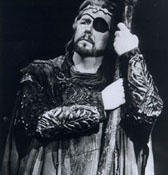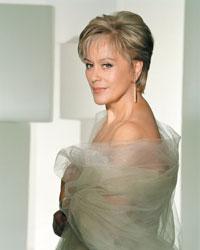Friday, July 29, 2005
Jazz
Jane Monheit definitely swings. She even says that her performances owe to Ella Fitzgerald. She scats a lot. I'm trained. I can spell it right now. She is singing classic songs from thirties movies in Taking a Chance on Love, and for my ears, my admittedly old-fashioned ears it's pretty hot. Her style is pretty white, but we won't hold it against her. She's sexier than Doris Day, but very natural. You definitely feel that this is her real voice. There's a bit of a southern accent. This is very fun. All you old fogies should definitely try it. And some of you younger ones, too.
Her "Over the Rainbow" is dreamy and full of longing.
Renée's album, Haunted Heart, does not swing. Would I ever choose to listen to this lounge lizard music? Can you successfully get your brain to forget that it's Renée Fleming? And where did that throaty sound come from?
Renée has the chops for this kind of music. She is all the way into this style, understands it completely and has the confidence to get free with it. She doesn't scat much. My complaints are usually focused on the fact that American singers can only get free with American music. I am looking for freedom of expression in classical music, too. The main thing you learn from listening to crossover recordings is how much is missing in their classical work.
Then we got to Mahler's "Liebst du um Schoenheit", a song that lies very deep in my heart. Why do I have to be in a crossover album to hear it done with all this emotion? Dammit! This is the song exactly as it should be sung, a glorious poem, gloriously set, gloriously sung.
The selection of songs is odd. There's something from Wozzeck, for god's sake. Even with lounge lizard music, I think I might have liked more consistency of style.
Jamie Cullum is a guy. The name doesn't give it away and neither does the picture on the album cover. He's cool.
#ad
Thursday, July 28, 2005
A day in the life
Then I would drive my Volkswagen beetle downtown and park it in the lot behind the new white theater. Ulm has a very nice modern theater with good facilities for the staff, courtesy of allied bombing in WWII. On the way in I would check the Spielplan pasted on the glass to see if my name appeared. I did both solo and chorus, and would need to read both the names of the operas and operettas, and also the cast lists to see if it said “Baker” or “Femar”, the other mezzo I was usually cast with. I was cheaper, so usually it was me. "Guten Morgen, Frau Baker," the Pfortner would greet. On the wall inside was the rehearsal and coaching schedule.
I had breakfast in the kantina every day: coffee and a ham sandwich.
The working day started around 10:00, and a lot of different things might be going on. Every morning the ballet did a workout in the ballet room. If there were no stage rehearsals, the chorus would rehearse in the chorus room.
I learned the German theater vocabulary:
Sitzprobe—this is a rehearsal with the orchestra, but without movement. This terminology shows up in American theaters.
Buehneprobe—this is a stage rehearsal which might involve piano only, but would have movement.
Hauptprobe—the main rehearsal before the performance, with orchestra, costumes, lights, alles.
Requisite—props. Also a line from Fledermaus where it means the same thing.
I was fascinated to find that left and right are the opposite of left and right in American theaters. In America left and right are as you stand on the stage. The director will say “exit stage left.” In a German theater left and right are as seen by the director sitting in the middle of the audience. If he says go left, he means your right.
In addition to rehearsing with the chorus, when I was preparing a role, I would be scheduled for sessions with the coaching staff, in my case both the musical and the language coaching staff. My German pronunciation, trained in America, was not felt to be up to German theater standards. I remember in Pique Dame, where I sang Pauline, I was supposed to sing the word “Fuesschen” (little feet). Ach! Bisschen I could manage, but Fuesschen completely eluded me. It came out like shush, which is totally wrong.
I had a piano at home and would try to get as far as I could on my own, but they were fully prepared to do the whole job of preparing me for a role had this been necessary. Coaching is good.
I was not allowed to say anything on the stage. Toward the end of my time there I was allowed to speak the words “O wie schoen!” This was a great honor.
If the chorus was not needed, we sat around in the kantina for endless hours drinking. Knitting was done. Skat was played. This is where I learned to speak German. Social status required that I sit with the chorus. Orchestra members sat with other orchestra members. Soloists sat with each other. I know that the San Francisco opera doesn’t allow alcohol backstage, but the Ulmer Theater kantina dispensed beer and wine. There were two refrigerators—one set to exactly the right temperature for white wine, and the other to the perfect temperature for beer.
You could have lunch in the theater kantina, but it was necessary to order it at breakfast time. These lunches were very nice, but I had a child and would go home to eat with him. After we were finished rehearsing, I would go shopping. At the time that I lived in Ulm there were no supermarkets. The closest thing to an American style supermarket was in the basement of one of the department stores downtown. I know when I go to Zurich there is a store called the coop near the train station that is exactly like an American store.
German school was mainly in the morning. Chris would come home with stories of what his teacher, Herr Butzenhart, had said that day. Herr Butzenhart was full of sage advice and wise sayings.
After lunch I would take a nap. It is a wonderful thing to take a nap every day. Life is somehow different. I learned there is an optimum length of nap—45 minutes. If you sleep for any longer, you don’t quite wake back up again. 45 minutes leaves you refreshed and ready to start again.
I liked to walk around in Ulm in the afternoon. There is a wonderful old town, and of course the Ulmer Munster, a famous church in the center of town. Ulm is on the Danube with beautiful paths along the river.
I didn’t work every evening. Christmas was the only holiday, but the opera shared its space with an acting theater with its own performers. We were required to appear on performance days by no later than 7:30, as I recall. I went to my assigned seat in the chorus dressing room and put my clothes in my locker. I sat between a mezzo from Austria who did very fine mother in Hansel and Gretel and a German soprano called Mariechen. Dolores sat at the end of the row. There were staff to sort out the costumes and help you change into them. There were different staff to put on your makeup and any wigs you might be wearing. There were lots of wigs, and your hair had to fit under them. Then there was more sitting around and more drinking. Lots of drinking. I know I never drank so much as then, and I definitely lost weight. You could also have dinner while waiting--hot dogs and potato salad.
We would sit and wait for the voice on the intercom: “Die Damen und Herren des Chores.” The stage manager had this cue marked in his score.
In the night after the performances were over sometimes there were parties in the kantina. I remember that Ursula had a large party for her 30th birthday. A few times very late in the night I would get very drunk, and I would smoke. Cigarettes and cigars. I found that I preferred cigars. I never have hangovers, but the taste of cigarettes lingers for a long time.
Sometimes Chris would come. He loved Fledermaus and went to several performances of that. It was a life, a better life than working for Bechtel. There, I said it. I am part of the staff of the hated Bechtel Corporation, builder of nuclear power plants and buyer of South American water systems. So why did I leave Germany? I couldn’t honestly say. I hadn’t finished my dissertation and taken my final oral exams, so I needed to finish that. And after that, who knows? Who knows why life plays out the way it does. My path was not leading to glory. I think of them often, always with love.
Wednesday, July 27, 2005
Why I am spoiled for all other singers
I have always loved Marilyn Horne. She sang, quite beautifully, "Mura felice" from La Donna del Lago and "Di tanti palpiti" from Tancredi. Four years before that a 22 year old Cecilia Bartoli recorded these same two arias. She is at her most mezzo on that recording and does repertoire on the low end of her range. She does Isabella's arias, for instance.
Marilyn is creating an achievement, and Cecilia is creating a song. Cecilia has always the problem that she started out at the top, above the top, really, producing recordings at a phenomenally young age that are simply miracles of phrasing and beauty. Her own personal rubato is present in every note.
I love you, Marilyn, but you can't compete. With Cecilia you simply forget how difficult this all is. It's just beautiful singing.
Tuesday, July 26, 2005
Italian Tenors
Here is an extremely interesting film called “Pavarotti and the Italian Tenor.” I would have to say I have probably never seen this before, but everything I thought is now confirmed. All music is of a time and place, and Luciano’s place is Modena. In the film he is shown singing with the Modena Rossini chorus, both as a young man and at the time the film was made.
I have been worrying about Italy. Is the tradition of Italian music carrying forward into the present and future? Are young people joining the Rossini choir in Modena?
Enrico Caruso, Beniamino Gigli, Tito Schipa and Giuseppe di Stefano are Luciano’s models, and films of each were shown. Pavarotti father and son quarrelled: the father preferred Gigli, but Luciano liked di Stefano. Luciano Pavarotti does not read music and often learns pieces by listening to these singers perform them. He is as far into being an Italian tenor as it is possible to get. There are films of a very young Luciano. Astounding.
This is where music comes from.
Monday, July 25, 2005
For Sarah
I went to the library and looked up everything I could find about her. I read the New York Times on microfiche in the Berkeley city library. I still have the pictures I took from it for 10 cents apiece. I became addicted to Arie Antiche until I started to be annoyed by the fact that I always knew what came next. My cd player would play them in random order. Wonderful! There was an awesome freshness to her interpretations that I simply could not resist.
I started traveling to Italy and studying Italian art. I went on the Piero della Francesca Trail and looked into buying an apartment in Rome.
Then I found out from watching the live Cecilia how completely non-traditional her technique was. As the years have passed, she has changed and I have become more accustomed to how she sings, but at the time….
Madness took over. I started writing to her. Obsessively. I still do, actually, about twice a week, but I stopped mailing them some years ago. I mailed one a couple of years ago after I had been to a psychic. This psychic is excellent if you ever want her email address. She said there was no hostility.
I am Cecilia’s stalker, I suppose. I see myself as a much too conservative old nerd, but nevertheless, she sees me coming and arranges something. Her eyes flash and her back straightens. She and I are about the same size, but she always seems much taller. No one believes this.
Lately I have decided that perhaps I should try harder to actually say something instead of standing there looking like a fool. So I said “you are my favorite.” Flash! Great. That’s the best I could come up with. I know from reading the forum that other people think of questions to ask her. Not me.
Right now I am regretting that I didn’t go to London to see Turco. Maybe there will be a video.
Sunday, July 24, 2005
French opera
For a wonderful immersion in French opera listen to Rolando Villazon's Gounod Massenet Arias album. We have been needing this man. Such sensitivity to Romantic opera is very rare, and his gorgeous dark voice must be heard to be believed. He is the man for today. I have been seriously considering looking for something of his to see. I think I missed the best bet--the Romeo et Juliette that was done in LA. Maybe there will be a film.
P.S.
I was listening again to Villazon's French arias album. I was thinking about his protestations about French style and how you weren't allowed to do portamento the way you could with the Italians. See article on tools.
Well, we are pleased to say he does not do exactly what he preaches.
There is plenty of scooping and sliding to satisfy even me. It would be
terrible to think the French were intent on being completely boring.
What a wonderful album. I loved it just as much this time.
#ad
Questions
Is opera a museum work? This is a fun argument and requires a pretty European look at things. If the answer is yes, then shouldn’t it be a MOMA instead of an old masters gallery? The lack of new works in the repertoire is seen as the fault of the managers and boards of the opera institutions around the world. “Force people to listen to new works whether they want to or not!” seems to be the manifesto. Ticket sales don’t even come into the argument. In America we have Broadway to provide alternatives to opera houses and symphony halls. So in a very timely way Opera News has an article about….
Is the American Musical dead?
Look, guys, the state of the musical arts basically went to hell in the twentieth century. The large institutions went on as though the nineteenth century had never ended while the heart went completely out of any new classical repertoire that came on the scene. Here’s a question for you?
How come we bragged so much about how superior capitalism was while Shastakovich went right on writing stuff that was significantly more interesting than anything produced in capitalist countries?
Because, you see, it all has to do with money. Ipod is saving Apple. Everybody likes the idea of buying music one song at a time for $1 or so. The number of people who want to buy a whole $20 cd is much lower. What if I don’t like it? So a $30 ticket to the symphony is going to appeal to how many people? And what if I don’t like it? And we haven’t even gotten to the $100 opera ticket.
Technology and the marketing of music to the mass public have changed everything. I hate to say this, but capitalism has won, and capitalism is Mariah Carey, not opera.
Friday, July 22, 2005
Whither Opera?
a manifesto for a living lyric drama
By Lukas Pairon
BRUSSELS, 17 April 2001
I can't help commenting on this. There's only one thing keeping people from forming opera companies around contemporary operas--and that is the operas themselves. If people honestly wanted more of these operas, they would be getting them now. Concentrate on coming up with operas anyone would want to hear more than once, or even once for that matter, and then we can come up with venues for them.
Thursday, July 21, 2005
What’s wrong with modern music
There are three things
1. The natural characteristics of sound—what is usually called acoustics
2. The natural characteristics of us, how we hear, how we perceive the sounds we hear, how we organize them in our brains, all things designed to support survival, not entertainment
3. The building up of expectation over time—learning
Education is a kind of fourth thing, but this fourth thing has only to do with the process of composition, not the cultural idea of music. Basically the problem is that our composers know too much. They are carefully trained to know all about serialism and every other cute trick someone has dreamed up over the centuries. To curtail this conversation to its shortest possible length, they know a very great deal more than they have any actual use for.
The most successful composers of the past took the idiom they were born into and manipulated it to their own ends. Wagner took the new ideas of modulation he was hearing all around him and organized them into a seething, writhing morass. Bach took the tricks of the fugue invented by others and carried these to new heights of expression and complexity. Both of these very different composers are just writing variations on the compositional style common to their own era. It is item 3, the building up of expectation over time, that makes this all possible. They owe a huge debt to those who preceded them, because it is they who created the context of expectation. A Bach that appears out of thin air is completely useless as well as completely impossible.
These modern composers with amazing skills are lacking one essential feature: a context of expectation. We never know what to expect. I know that Messiaen had a whole theory of composition that he based his pieces on. I don’t need to know what this is to realize that his theories allow him to build up a context of expectation for me the listener. My brain knows what he’s doing without understanding his theories and is able to derive pleasure from it.
Gross generalization number one: theories of composition are for composers. In the precise second that the listener needs to know about them, the sounds in question have ceased to be music. Our brains make up their own solutions, and do not require the assistance of theoreticians.
The music of today lacks an overriding cultural style. Our music is absolutely all over the place, so society is not being particularly helpful to people wanting to write music.
I’m going to put in a little Vivaldi, some Brubeck, here and there a little tango. You actually hear composers saying things like this. Spend a lot more of your time concentrating on the context of expectation you are creating for the listener and lots less on impressing us with how much you know and how well you write.
Which reminds me of my Imbrie story. There is a composer named Andrew Imbrie, and when I was in the San Francisco Symphony Chorus we were assigned to sing one of his pieces. Every week, sometimes two or three times a week, we would come and take out his piece, and every rehearsal there would not be three notes that sounded familiar. It was always a new piece each time we rehearsed it, and this went on for weeks. He seemed completely successful at eliminating expectation and probably would not understand if I told him this was a bad thing.
Create in me an expectation. Society is not providing you with a context, so that means you have to create one. The context and the expectation are one. Help me anticipate where you are going, because it is my anticipation that creates the music.
Gross generalization number two: it is the listener and the process of listening that makes it music. Not you.
In Doctor Tischler's history classes we were taught that tonality was the invention of the Italian composer Archangelo Corelli. Up until then strong harmonic direction existed mainly only at the cadence points and in between things went in pretty much any direction. Tonality meant that this sense of harmonic pull permeated the entire composition. This was a powerful concept that then swept the musical world and became the primary interest of composers for 200 years.
The attraction of tonality is that it provides a context for anticipation. We love the sensation of being pulled along. Pop still includes this feature, but the fascination of tonality to the exclusion of virtually all else is gone. Serious composers today seem offended by the idea that someone would easily organize their materials into understandable structures. Confusion seems to be the objective.
Many of the most attractive composers now belong to the school called minimalism. They have decided to pare it all down and try again. Maybe too much complexity is just boring. Glass is the most extreme, but Pärt is definitely a minimalist. So is Górecki. Less is definitely more.
Footnote: Corelli created the reality of tonality, not the theory--that came much later.
Tuesday, July 19, 2005
Singing
Those of us who love the opera worry what will become of it. It is an institution that celebrates a time now passed. Vanessa and The Ghosts of Versailles will never replace Tosca and Die Meistersinger.
I am very pleased to recommend to you some new singers: Rolando Villazon, Anna Netrebko and Salvatore Licitra can help you forget the singers of the past, or at least they can help you miss them less. Cecilia is so uniquely herself that there is no one she will help you forget. If there are no new operas, at least there are new singers to sing the old ones.
Monday, July 18, 2005
The Ghosts of Versailles

Marie Antoinette soprano Teresa Stratas
Beaumarchais baritone Håkan Hagegård
Figaro baritone Gino Quilico
Susanna mezzo-soprano Judith Christin
Countess Rosina soprano Renée Fleming
Bégearss tenor Graham Clark
Count Almaviva tenor Peter Kazaras
Florestine soprano Tracy Dahl
Léon tenor Neil Rosenshein
Samira mezzo-soprano Marilyn Horne
Louis XVI bass James Courtney
Woman in a Hat mezzo-soprano Jane Shaulis
Cherubino mezzo-soprano Stella Zambalis
Conductor James Levine
Production Colin Graham
I was once in a production of The Marriage of Figaro where the characters of the opera shared the stage with another cast of ghosts. They observed. When anyone needed a prop, they handed it. Their raggedy costumes showed that they were clearly dead. In fact they began their theatrical existences by stepping out of pine coffins.
But in that opera only the living had music to sing. John Corigliano’s The Ghosts of Versailles felt to me to be the opera for that other cast. The members of the first cast were there as well: the count and countess Almaviva, Cherubino, Figaro and Susanna were all there, along with the count’s daughter and the countess’s son. It's like Corigliano had been there.
In addition to my cast of memory were Beaumarchais himself and the Queen of France. There is also a villain named Begrass. The opera is in fact about the Queen of France, Marie Antoinette. She wishes that she had not died, and Beaumarchais promises to give her this ending.
Why am I writing about this now? The critics think Corigliano is one of their favorite composers. Among the many videos lying around the house unwatched is a copy of The Ghosts of Versailles. Perhaps now is the time to watch it and see for myself.
Berlioz would have loved this. He was the one who didn’t care at all about consistent narrative and instead only wanted to write about the interesting parts. So we have long sections of eerie ghost music. Beaumarchais and the count have a duel, which ends with Beaumarchais being stabbed and everyone laughing—they’re dead. It makes no difference. The countess and Cherubino take a trip to the Garden of Earthly Delights which results in their child. There is an ode to the worm. A mysterious giant man named Sulyman Pasha appears for no reason at all, and at the end of the first act he explodes. Just before this explosion Brunnhilde comes out to declare, “This is not an opera. Wagner is opera.”
The pasha brings entertainment in the form of Samira, a character seemingly inserted into the opera in order for Marilyn Horne to perform a truly spectacular aria. We all miss Marilyn. She is loving every minute of this.
There is the trial of the Queen of France followed by her trip to the guillotine. Teresa Stratas in the role of Marie Antoinette was wistful and lovely.
So what is opera? Opera is things that happen in opera houses, music sung by opera singers and played by opera orchestras. Above all opera is singing. There was singing, occasionally great singing, often screechy singing. It’s a pastiche, but a pretty fabulous one. Marie decides to love Beaumarchais and stay dead. Nothing in life is likely to be this fun.
#ad
Saturday, July 16, 2005
John
His favorite was Bach. There are no recordings like his Bach choral works. Bach seems to be felt as a small composer. Glenn Gould saw him large and passionate and so did John. His Bach was larger than your heart could contain. It shook you until you could bear it no more. He found the music of his own soul in Bach and communicated it to us.
I wish there were somewhere to direct you where you could experience this yourself.
Friday, July 15, 2005
Vanessa
 for content.
for content.This House of Opera film of Samuel Barber’s Vanessa from Monte Carlo is shot from a single camera that zooms in and out to focus on the main characters. It is clear to me from watching this that it would be possible to film a lot more operas than one would think. It looks the way it would look. Why should we need more than that? The set features a long winding staircase in the center that is the route out. There is in this particular case a problem of balance between the singers and the orchestra. Barber’s orchestration is very heavy, and is much too loud on the dvd. This may be due to the location of the microphone, of which there seems to be just one.
The plot is about unrequited love. At the beginning of the opera the “ferne Geliebte” is awaited, anxiously awaited. Vanessa has been waiting 20 years for Anatol to return to her. For me the best scene in the opera is toward the beginning. Anatol has arrived, has descended the long staircase and stands in shadow toward the bottom. Vanessa tells him not to utter a word and proceeds to tell him how much she has done for him, for love of him, how long she has waited for his return. It’s very intense, very openly soul-baring. Finally she says “Do you still love me?”
The lights come up on his face and he replies, “Yes, I believe I shall love you!” It’s a fabulous moment. He’s the wrong guy, and Vanessa panics and leaves the stage. He tells us that all his life the name Vanessa would “Scorch my mother’s lips and light my father’s eyes.” This man is indeed Anatol, but he is Anatol the son.
The neice Erica comes in and fills the empty space. Anatol tells her, “I am Dmitri the pretender. Be my Marina.” The libretto is by Menotti. Could you tell? Erica spends the night with Anatol, but once Vanessa returns he sees no one else. [Note added years later: Dmitri and Marina are characters from Boris Godunov.]
It is an opera about love. Who could resist being told that someone had waited 20 years just to love them? If anyone you knew did this, you would think they were mad, but in an opera it gives the drama an emotional depth that stays in the memory. It aspires to greatness with a lot of grand music, but ultimately it falls short musically.
Kiri te Kanawa is Vanessa. The other cast members are named Anderson and Shauffer. That’s all I know.
Professional brain
I knew there would be good stuff here.
Thursday, July 14, 2005
La Dolce Vita
For Cecilia it may be part of her heritage as a Roman, this most Roman of Italian movies. It is, of course, forbidden to get into the fountain, forbidden as opera was forbidden in Rome when these pieces were written. This is undoubtedly the intended parallel. It's a truly wonderful picture, beautiful on its own and layered with ancient meaning.
Monday, July 11, 2005
Proibita
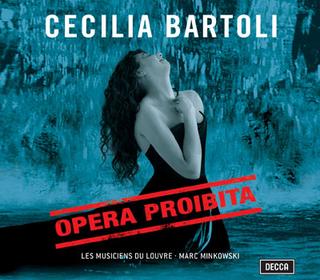
Ach! du meine gute! La dolce musica. Cecilia is doing Anita Ekberg in the Trevi Fountain. Well, I have already thrown my coins. This sounds really, really good. Are we to believe this album is x rated? What fun. I was needing cheering up.
This refers to Cecilia Bartoli's new album Opera Proibita.
I could never have seen in my wildest imagination the direction Cecilia Bartoli's career has taken. I wrote about the missing Italians in previous blogs, the men who invented opera but whose works are seldom heard. High on this list are Caldara and Alessandro Scarlatti, two of the featured composers on her up-coming album. She is altering the landscape of music. I admire her deeply.
#ad
Saturday, July 09, 2005
Reverberation
I am very familiar with Fauré's Requiem, but was completely unprepared for the transformation it underwent with the long reverberation of Grace Cathedral. Now Gabriel Fauré worked as an organist in cathedrals in Paris and must have known exactly what would happen. He knew that the tones dying away from the previous chord would increase the beauty of the succeeding chord. How would you know this if you didn't experience it first hand?
With Bach this doesn't happen. The reverberation just obscures the counterpoint.
Friday, July 08, 2005
Singing (what else?)
The way it works is this. Vocal technique also has different styles. A classical singer learns to hold his larynx in a position that allows the voice to maximize its vibrato. This is what is wanted in the opera world. What is desired is the maximum richness and the maximum flexibility at the same time. Except for Wagnerians who can do without flexibility.
Up until the recent ornamentation phase flexibility was not a requirement for a pop singer of any genre. A pop singer needs completely successful mixing in the center which is usually achieved by singing low, flattening out the tone, and not pushing the larynx down. This is a completely different technique.
I know that as a young person I had a voice teacher who decided I was a true contralto. She spent many hours teaching me to push my larynx down to get a contralto-like sound. I couldn't sing pop any more. Mixing in the center got a lot harder. I have since decided that she was wrong and completely screwed me up.
Then there is the style issue. The right style for Wagner is not the right style for Gershwin. It's also not the right style for Puccini.
You can mix these genres only if you are happy with being bad in all but one and not truly great at any. I haven't heard Renée Fleming's jazz. I'll look into it. I liked her operatic "Over the rainbow" because she didn't try to pretend she isn't an opera singer.
The wisest singers in any genre will focus on developing a style and technique that completely suits them and then limit this to a repertoire where it is suitable. Ella Fitzgerald didn't branch out into opera. Perfection in music is usually combined with unity of purpose.
Wednesday, July 06, 2005
Figaro
Figaro: Bryn Terfel (bass)
Susanna: Cecilia Bartoli (soprano)
Doctor Bartolo: Paul Plishka (bass)
Marcellina: Wendy White (soprano)
Cherubino: Susanne Mentzer (soprano)
Count Almaviva: Dwayne Croft (bass)
Countess Almaviva: Renée Fleming (soprano)
Barbarina: Danielle de Niese (soprano)
Among the treasures in my collection is one that is particularly valued: a film of a production of Le Nozze di Figaro at the Metropolitan Opera starring Renée Fleming, Bryn Terfel and Cecilia Bartoli. I don’t think it has ever been released commercially, and I have it only because I filmed it from a broadcast. House of Opera doesn’t sell it.
It was a surprise when it was announced that Cecilia would sing the role of Susanna, a role I don’t think she has sung since. There was a huge scandal because she insisted on performing different arias. I know “Un moto di gioia” is one of her favorites. Her choices, especially the final aria, are very successful, but she does not sing “Deh vieni non tardar.”
I have felt since I first saw this film that I never really understood this opera before. In a world where everything had to be about status and privilege, where the operas were clearly divided between elevated moral dramas about the upper classes and comedies in dialect from the lower classes, Mozart has brought us real people from all the various classes of his era, people with serious problems, people like us. I don’t think I really understood how deeply serious Figaro really is.
Cecilia is key in the success of this entire performance because she makes you feel how much Susanna loves Figaro and how much she hates the idea of sex with the count, how much she loathes his attentions while successfully masking her emotions from him. This is the content of the Marriage of Figaro, not just the jokes. I have read the book this is based on, but it is Mozart and da Ponte who give true life to these people.
There is a wonderful rapport between Cecilia and Bryn which they exploited in a duet album and dvd. This rapport is at its best here. They are exciting and very charismatic together.
As if this were not wonderful enough, there is also the fabulous countess of Renée Fleming, who needs only to sit around being miserably regal while singing two of the most gorgeous arias ever written. Gorgeously. She is in top form.
It is a succession of perfectly executed scenes by ideally cast singing actors. When was Figaro’s discovery of his parents ever so perfect? The count and countess are effectively upper class while Susanna and Figaro are common, as it should be. The entire production is pure perfection in singing, conducting and ensemble acting, and never becomes stale.
As one who has long adored Cecilia and has seen a lot of her stage work, this is her masterpiece.
[See Kinderkuchen History 1780-1803]
Maria Ewing
Carmen
L'Incoronazione di Poppea
Salome
All of these performances are available on video. Opera is such a great entertainment form.
The Salome is especially noteworthy. Maria Ewing has spoiled it for every other soprano by performing a spectacular striptease worthy of a porn house. I saw this production in San Francisco, where anything goes, where it was received to great acclaim.
It isn't a great sung Salome, but it isn't bad either. Her Salome is wonderfully perverse--Oscar Wilde, whose play this is, would have loved it. I think it has shortened her career to sing this, but it has also bought her immortality.
Tuesday, July 05, 2005
Sexiest Opera Singers Today
Cecilia Bartoli, soprano, born in Rome, Italy, and always high on this particular list, she is now even higher with her slimmer figure and fabulous performance in Il Turco in Italia.
Jose Cura, tenor, born in Argentina, is one of the great smoldering Latin tenors, of which we are more than adequately represented here.
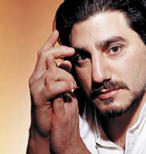
David Daniels, countertenor, born in South Carolina. I can’t believe it either, but there it is. He looks especially fabulous in his half grown beard, still a popular look in Italy and elsewhere.
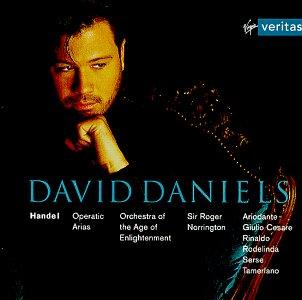
Renée Fleming, soprano, from Pennsylvania, with her preference for Dvorak and Strauss, sings with enormous sensuality.
Juan Diego Florez, Rossini tenor, born in Lima, Peru in 1973, is the youngest in the list. Si, senor.

Anna Netrebko, coloratura soprano, born Krasnodar, Russia, defines the category.
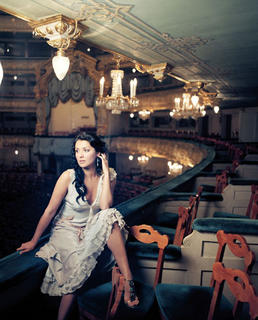
Kiri Te Kanawa, soprano, a Maori from New Zealand, is the oldest in the list but definitely still has it.
Bryn Terfel, baritone, born in Wales. Sexy is as sexy does, and Bryn is a performer with enormous animal magnetism and a warm, sensual voice.
Rolando Villazon, tenor, from Mexico City, is another dark Latin type. Do you notice a certain theme here? His singing is very sexy.
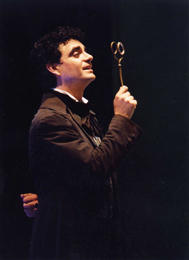
Special opera only category--Sexiest in Drag:
Anne Sophie von Otter, mezzo-soprano, born in Sweden, looks great in regular girl’s clothes, too.
Karita Mattila, soprano, born in 1960 in Somero, Finland, is included for her fabulous flirting in Fidelio.
Who says movie stars are sexier than opera singers? Each of these singers has his or her own web site with pictures where you may judge for yourself.
Monday, July 04, 2005
Poetry
Warm rain is falling from a cloudless sky
Wet grass is seeping into my fantasy,
Velvet thoughts of you come to my memory
Like remembered dreams of haunting ecstasy.
Don't leave me.
Don't leave me.
Stay in my arms forever.
Stay in my dreams.
Stay in my heart.
Stay in my arms forever.
[Second verse finished after seeing Charlie and the Chocolate Factory.]
This garden is losing all its shades of green.
Autumn is passing in a purple stream
Of aster petals fading into soft
Visions of chocolate maple cream.
Don't leave me.
Don't leave me.
Stay in my arms forever.
Stay in my dreams.
Stay in my heart.
Stay in my arms forever.
Musical Brain
I always read everything about the brain. I stole the March National Geographic from my doctor's office because it has a long article about the brain. The only musical thing that interested them was absolute pitch, apparently a learned facility much more common in the orient.
Jourdain goes through everything very quickly but tries to cover every conceivable topic. I'll let you know what he has to say.
Sunday, July 03, 2005
Arvo Pärt Passio
The texture of the music is very much like some of the works recorded by Anonymous 4. Medieval. The number of voices changes but the chant-like quality of the music does not. It is like free organum or the music of Leonin and Perotin, only with precisely one syllable to one note, all voices in the same rhythm.
Except that it isn't. The harmonic language is distinctly modern with lots of dissonance, and not the harmony based on fourths used by Leonin and Perotin. Instruments accompany.
At first, being used to Bach, I found the evangelist confusing until I realized that he is using a quartet of soloists in ever changing combinations instead of Bach's lyric tenor. Jesus is a bass.
It's mysterious and haunting. You would expect to pray.
#ad
Reviewing
Bebe tried to come up with an appropriate venue to present the amazing songs of Kurt Weill. She even had the guts to leave out Weill's hit tunes “Jenny’s Song” and “Mackie Messer,” otherwise known as Mack the Knife. She came up with a little bit of plot, a lot of ambience, a little bit of dancing and a lot of singing. It’s just that her voice gave out. So does that mean it's good or bad? In a ranking with other Kurt Weill shows she gets 1 or 2 stars. In a ranking with other stuff she gets at least 3 stars.
Michael Tilson Thomas, the conductor of the San Francisco Symphony, sometimes gives the impression he would rather be working Broadway. He has a certain musical vision that does not precisely overlap with standard orchestral repertoire. In fact it often does not overlap at all. He has no head for broad, slow tempos, for instance. If you are an impatient person, he’s your man. I’d never heard these Gershwin shows before, and now I have. They were well presented, and I was mildly entertained. The performers did as much with them as they possibly could. So how many stars does it get? Boring works brilliantly presented gets what?
Saturday, July 02, 2005
Bach
The highlight on ARTS this morning is a guy named Larry Adler playing Bach on the harmonica. He plays two pieces, "Siciliano" with piano accompaniment and "Gavotte" alone. It's fabulously expressive. Who would have thought?
This was followed by a jazz trio playing Bach's Fugue #5 from the Well Tempered Klavier in the market square in Leipzig. They are definitely making me believe. Maybe Bach invented jazz. I love to hear things made into something else. It bends your brain in a very pleasing way. I never found out anything about Beethoven on the electric guitar.
Friday, July 01, 2005
Tenors
We have not had a truly wild tenor since Corelli and Mario del Monaco, and now there is Licitra. A gap has been filled. Since this Trovatore video he has lost weight and gotten rid of several pounds of hair. I rather liked his furry persona--it reminds me of my son when he was younger--though I realize it may be costume. Licitra is a spinto.
The best of the videos I bought from House of Opera is the La Boheme with Rolando Villazon. I can definitely recommend it. He has a dark lyric voice and is handsome and pleasant looking. He is very polished musically and uses his body well. He and his Mimi (Alexia Voulgaridou) are more beautiful than any of Baz Luhrmann's La Boheme people. The performance seems to be taking place outdoors on a barge somewhere in Germany. Since it is outdoors, they are wearing microphones in the Madonna configuration. Miking outdoor performances is definitely a good thing. It is well photographed and recorded, and the performance, while not quite as awesome as Bjoerling and de los Angeles, is still very nice indeed.
It is easy to imagine this handsome man with the dark voice paired with similarly dark voiced and beautiful Anna, but it would not be La Boheme--she insists on singing Musetta and not Mimi. She likes the idea of men at her feet.
And we have Florez for Rossini and Heppner for Wagner. Our cup truly runneth over.
Making music
There is simply nothing like making music, and writing about it does not provide at all the same satisfaction. Ones perception of any work grows and changes over time. No matter how well something is done, it is always possible to improve on perfection.


